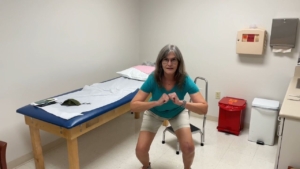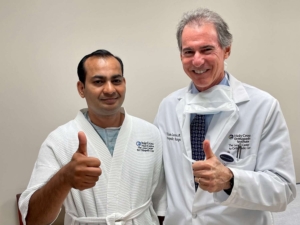What’s Your Hip Replacement IQ?
(First of a three-part series)
If your hip is limiting your ability to be active and/or causing pain that is not being relieved with conservative treatments and you’ve concluded that it’s time to have hip replacement surgery, then it is in your best interest to make sure you know what to expect during and after your operation. Taking the time to write down all your questions is time well spent, as it avoids that feeling of helplessness that makes you feel like your head is spinning. What happens during the surgery? How long will I be out of commission? Am I going to be in excruciating pain? Will I ever again be able to dance or play the sports that I love?
At The Leone Center for Orthopedic Care at Holy Cross Health in Fort Lauderdale, our experience repeatedly teaches us that well-informed patients have an easier time recuperating from their surgery and resume their full activities and lifestyle faster than patients who haven’t taken the time to ask questions and get answers. As with most life experiences, knowledge is power.
We are a concierge practice with a personalized approach that begins with the first phone call and continues throughout your care. No crowded waiting rooms and rushed meetings with Dr. Leone. We model our care according to the way we would want our own families to be treated and that means that only the best will do.

How much do you know?
The series includes total of 20 TRUE or FALSE questions. Expanded answers are provided for each question at the end of each “quiz”. This first series includes 7 questions which have been written to test your knowledge, inform, and help educate you about total hip replacements. These are the same questions that many patients have asked over the years.
You can also receive a helpful booklet (downloadable from the Leone Center website) filled with step-by-step information.
True or False?
- Your hip joint is made of two parts: the hip socket and the ball at the upper end of your thigh bone.
- The most common reason to have a hip replaced is to relieve arthritic hip pain.
- Physical therapy can delay, but not prevent the arthritis from progressing or the need for a hip replacement.
- Many people have successful hip replacement surgery in their 80s or 90s.
- Osteoarthritis always occurs as we get older.
- There is no cure for osteoarthritis, but there are ways to manage the pain and progression of the disease.
- People over 65 should not expect to ever fully recover from a hip replacement.
Answers:
(1-7) True, True, True, True, True, True, False
- TRUE: Your hip joint is made of two parts: the hip socket and the ball at the upper end of your thigh bone.
Our hip joint socket is called the acetabulum and is made from the fusion of three bones that make up the pelvis. The acetabulum is lined with a specialized cartilage called hyaline cartilage that relieves friction, acts as a shock absorber and distributes force to the underlying bone. Unfortunately, when injured, hyaline cartilage does not heal, which can lead to arthritis.
At the upper end of our femur bone is the femoral head, which looks like a ball and moves in the acetabulum. Like the acetabulum, the femoral head is also covered with hyaline cartilage. A common reason why a hip becomes arthritic and ultimately requires a total hip replacement is because the relationship between the femoral head and acetabulum is not optimal, so the joint deteriorates. Often, this condition is genetic.
- TRUE: The most common reason to have a hip joint replaced is to relieve arthritic hip pain.
There are numerous indications to replace a hip joint. Pain from a deteriorated “arthritic” hip joint surface is the most common. Treating an arthritic hip with a total hip replacement is a remarkably predictable way of relieving pain. When pain is relieved, range of motion and function typically improve, and limps resolve because the joint no longer hurts.
- TRUE: Physical therapy can delay, but not prevent the arthritis from progressing or the need for a hip replacement.
The goal when treating an osteoarthritic hip is to slow down the progression and minimize symptoms with non-surgical treatments, which include physical therapy until “conservative treatments” are not effective. Then joint replacement becomes appropriate. Patients who go into surgery more fit and with stronger muscles get well faster than patients who are not. Whatever exercise you can do before surgery that strengthens your muscles and improves your fitness will benefit you, making your surgery safer and your recovery easier.
Many times, physical therapy can decrease symptoms caused by an arthritic hip joint, at least temporarily and in an early stage, by improving hip flexibility and strengthening the muscles that move our hip.
Physical therapy is an important and appropriate treatment for hip arthritis, especially in the early stages and is part of “conservative management”. Unfortunately, physical therapy does not stop the progression of joint destruction or reverse it. If someone presents with advanced hip arthritis, then physical therapy can sometimes make this condition worse causing more pain. If physical therapy is making the condition more painful, then stop the physical therapy.
“Preparing for Your Total Hip Replacement” is a booklet that outlines a number of exercises that you should do before your surgery and can be downloaded from the Leone Center website.
- TRUE: No one is too old to have a hip replacement.
Dr. Leone has cared for many patients who delayed or decided not to have a hip replacement surgery because they thought they were too old or were told they were too old. Age is not a contraindication, but rather a consideration and another important variable that must be respected when caring for an older patient. Older folks heal just as predictably as younger folks, although it sometimes takes a little longer.
It is important for anyone who is contemplating hip replacement surgery to be thoroughly evaluated before their surgery. All medical conditions or problems must be defined, optimized and then managed. What Dr. Leone often finds is that when this occurs and any modifiable risk factors addressed, such as better control of one’s diabetes or hypertension, cessation of smoking, or losing weight, that surgery can proceed safely. Caring for some people is more difficult and even risker than caring for others. This is almost never due to one’s age but rather their medical conditions or their specific hip issue that necessitates surgery.
“It has been relatively rare in my experience that someone cannot proceed with surgery because of an underlying medical condition after it has been optimized” says Dr. Leone. Patients should never be told they can’t have surgery solely because they are older.
- TRUE: Osteoarthritis is an age-related condition.
This is kind of a trick question. Osteoarthritis is the most common type of arthritis, as well as the most common diagnosis necessitating hip replacement. It is also true that osteoarthritis is more common as we get older. But not everyone who is lucky enough to enjoy old age will develop osteoarthritis. Like many things in life, there are multiple factors involved. TRUE: There is no cure for osteoarthritis, but there are ways to manage the disease.
Osteoarthritis results in a progressive destruction of the specialized hyaline cartilage covering the bones that comprise our hips. The cartilage helps to decrease friction as the bones move against each other, act as a shock absorber and distribute the hip forces. Unfortunately, hyaline cartilage does not heal, so when it is injured it progressively deteriorates, resulting in bony destruction, swelling and deformity.
The goal when treating an osteoarthritic hip is to slow the process down and minimize symptoms with nonsurgical treatments. Hip replacement becomes appropriate when nonsurgical “conservative” treatments are no longer effective.
- FALSE: People over 65 should not expect to ever fully recover from a hip replacement.
This is a silly statement! We’ve all heard the cliche that age is just a number. Well, when it comes to surgery, truly it is not how chronologically old someone is, but rather how physiologically young they are. Dr. Leone cares for folks well into their 90s and some are healthier than others in their 60s.
So, of course people who have their surgery when they’re 65 years old and much older can have wonderful and complete recoveries. What is important is optimizing whatever conditions they might have before their surgery, which makes surgery safer and their recovery safer and easier.
Dr. Leone emphasizes to his patients that whatever they need to do before their surgery, such as lose weight, stop smoking, get better control of their diabetes or hypertension is for them. Optimizing any modifiable risk factors ahead of time hopefully will lead to a longer, more active and fulfilled life, as well as a safer surgery and faster recovery.
The Leone Center for Orthopedic Care provides highly personalized, end-to-end orthopedic care for people with hip and knee conditions. Dr. William Leone offers patients the latest, most-promising innovations in joint replacement surgery, in a compassionate, patient-focused setting. He has performed over 15,000 joint surgeries over the course of his career, restoring mobility and improving quality of life for thousands of patients from all over the world.
The Leone Center for Orthopedic Care at Holy Cross Hospital is located at 1000 NE 56th Street in Fort Lauderdale. For more information or to schedule a consultation please call 954-489-4575 or visit holycrossleonecenter.com.
Check out Dr. Leone’s Patient Testimonials. These grateful patients make it all worthwhile.






